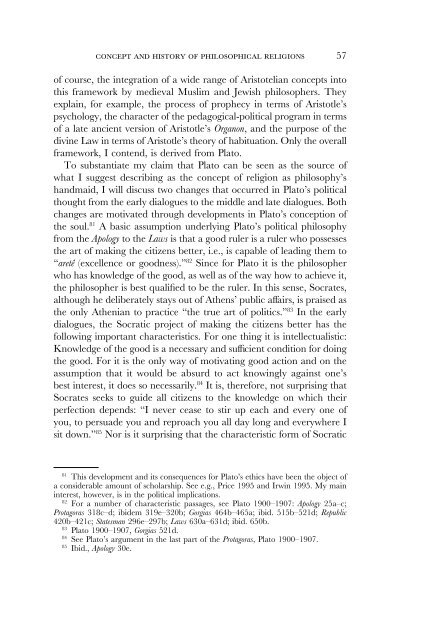Download PDF - Carlos F. Fraenkel
Download PDF - Carlos F. Fraenkel
Download PDF - Carlos F. Fraenkel
Create successful ePaper yourself
Turn your PDF publications into a flip-book with our unique Google optimized e-Paper software.
concept and history of philosophical religions 57of course, the integration of a wide range of Aristotelian concepts intothis framework by medieval Muslim and Jewish philosophers. Theyexplain, for example, the process of prophecy in terms of Aristotle’spsychology, the character of the pedagogical-political program in termsof a late ancient version of Aristotle’s Organon, and the purpose of thedivine Law in terms of Aristotle’s theory of habituation. Only the overallframework, I contend, is derived from Plato.To substantiate my claim that Plato can be seen as the source ofwhat I suggest describing as the concept of religion as philosophy’shandmaid, I will discuss two changes that occurred in Plato’s politicalthought from the early dialogues to the middle and late dialogues. Bothchanges are motivated through developments in Plato’s conception ofthe soul. 81 A basic assumption underlying Plato’s political philosophyfrom the Apology to the Laws is that a good ruler is a ruler who possessesthe art of making the citizens better, i.e., is capable of leading them to“aretê (excellence or goodness).” 82 Since for Plato it is the philosopherwho has knowledge of the good, as well as of the way how to achieve it,the philosopher is best qualified to be the ruler. In this sense, Socrates,although he deliberately stays out of Athens’ public affairs, is praised asthe only Athenian to practice “the true art of politics.” 83 In the earlydialogues, the Socratic project of making the citizens better has thefollowing important characteristics. For one thing it is intellectualistic:Knowledge of the good is a necessary and sufficient condition for doingthe good. For it is the only way of motivating good action and on theassumption that it would be absurd to act knowingly against one’sbest interest, it does so necessarily. 84 It is, therefore, not surprising thatSocrates seeks to guide all citizens to the knowledge on which theirperfection depends: “I never cease to stir up each and every one ofyou, to persuade you and reproach you all day long and everywhere Isit down.” 85 Nor is it surprising that the characteristic form of Socratic81This development and its consequences for Plato’s ethics have been the object ofa considerable amount of scholarship. See e.g., Price 1995 and Irwin 1995. My maininterest, however, is in the political implications.82For a number of characteristic passages, see Plato 1900–1907: Apology 25a–c;Protagoras 318c–d; ibidem 319e–320b; Gorgias 464b–465a; ibid. 515b–521d; Republic420b–421c; Statesman 296e–297b; Laws 630a–631d; ibid. 650b.83Plato 1900–1907, Gorgias 521d.84See Plato’s argument in the last part of the Protagoras, Plato 1900–1907.85Ibid., Apology 30e.



